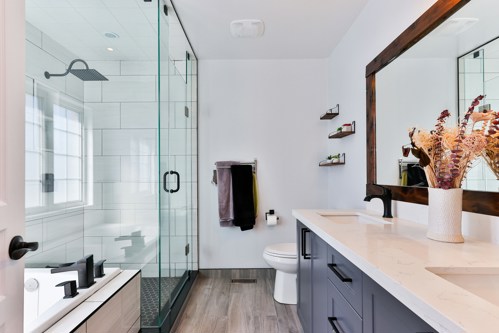
Home renovations are a huge undertaking, in terms of both time and money. However, the rewards can be worthwhile, if you manage your project correctly.
In this blog, we’ll look at the vital steps you should take to successfully renovate a house. Taking into consideration planning, budgets, funding and much more.
Why renovate your house?
Home renovations are mainly used to improve your living space. Perhaps you need extra space in the form of a spare bedroom, living room or study. You may also be looking to modernise your home by updating old features, providing you with more comfort and better energy efficiency.
Alternatively, you might be looking to add a more personal touch. Renovating your home may let you customise your living space to match your style and lifestyle needs. Whether updating decor, adding smart technology, or making custom features, they can make your house feel cosier.
Sometimes, you might need to do vital home improvements, especially for old or neglected properties. You can fix maintenance problems and repair damage over time to make sure your home lasts longer and stays strong.
Most of these projects will come with the bonus of improving property value. Well-planned improvements can increase the resale value of your home by modernising its features and improving its overall appeal to buyers.
The process of renovating a house
The first step is to assess your needs and plan the changes you want to make. You might have many projects in mind, so prioritise the ones that matter most to you. Essential repairs should be your top priority if needed.
Next, check your budget for the work. Knowing your finances is key for any type of home improvement project. If you have savings, see if it's enough to cover everything and consider whether you’ll need extra funding. Think about materials, labour, and other costs when planning your budget.
Once you’ve decided how to fund your renovations, you’ll need to consider who will be carrying out the work. Hiring the right people could affect the success of your plans. Research contractors thoroughly by looking for reviews or asking friends and family for recommendations.
If you are choosing to do it yourself, get the right tools and research techniques. You might save money, but errors are common without experience. Proceed cautiously and be ready to solve problems for the best outcome.
Once the work is in progress, it's vital to oversee the project to ensure quality and make sure your plans are being carried out correctly. Regular communication with the contractors, if you use them, allows you to address any concerns or changes promptly.
Reviewing the budget throughout the process is also vital to avoid overspending. Keep track of expenses and adjust the budget as needed to stay on track.
During the project, unexpected issues may arise, so it's crucial to have a contingency plan in place. Set aside a portion of your budget for unforeseen expenses or delays to avoid any disruptions to the project timeline.
How do you fund renovations?
If you don’t have enough savings, you may need to explore financing options to help you complete the project. There are a few different home improvement loans available to you if you need extra funds:
Remortgage:
A remortgage is when you swap your current mortgage for a new one. Many people do this to release the equity they have built up in their property.
When you remortgage, you can ask your current or a new lender to increase your mortgage by the desired amount. For instance, if you need £10,000 for a home renovation, you could ask to increase your mortgage by this amount. It's important to note that opting for this approach may result in higher monthly payments and an increase in your overall debt. However, it can be a useful method for getting extra funding.
Secured loans:
With secured loans, you borrow money by using your property as security for the loan. These solutions are also called second mortgages and homeowner loans. With this option, you can usually access larger amounts of money, making them a great option for bigger projects.
Although they can be a good solution, you must remember that using your property as security carries the risk of repossession if you miss repayments. Therefore, you should always make sure that you can easily afford the repayments before committing.
Unsecured loans:
With an unsecured loan, you can borrow money without using your property as security. Your eligibility for this option depends on your income and credit score. Because of the increased risk associated with it, these loans often have higher interest rates compared to alternative solutions.
Additionally, they generally offer smaller loan amounts, making them better suited for minor upgrades and renovations.
Summary
In summary, renovating your home demands careful planning, budgeting, and smart decisions. Prioritise essential repairs and explore different financing options to find the right solution for you. With attention to detail, your dream home can become a reality.
Think carefully before securing other debts against your home. Your home may be repossessed if you do not keep up repayments on a mortgage or any other debt secured on it.




